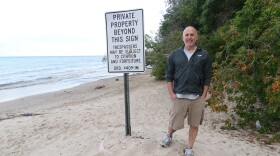Experiencing wars through film is often one of the few ways that audiences of all ages can connect with the tragedy of conflict. World War II and Vietnam War have had their share of films, but World War I has yet to get quite the same treatment. However, the film 1917 could change that.
Written and directed by Sam Mendes, 1917 follows two young British soldiers — Lance Corporal Schofield (played by George MacKay) and Lance Corporal Blake (played by Dean-Charles Chapman) — who are given a mission to deliver a message past no-man's land in order to prevent fellow soldiers from walking into a trap. The audience is taken literally into the trenches with these characters as we follow the soldiers on their mission.
https://www.youtube.com/watch?v=gZjQROMAh_s
1917 is shot by cinematographer Roger Deakins, and it’s made to look like it's been made in one continuous take — "a two-hour adventure across no man’s land,” according to film contributor Dave Luhrssen.
"The long-take method did enhance the idea that you and the audience we there — trailing them, ahead of them by a few feet, following them along as they went to be on their mission. I found it to be effective," he says.
1917 is based on the stories that Mendes heard from his grandfather, who served at the front. And while Luhrssen has a feeling this particular story was made up, "a lot of the details are based on things that his grandfather recalled."
There is limited use of CGI (computer generated imagery) and the film immerses you in massive sets — from trenches above and underground to abandoned, decimated towns. Luhrssen notes it's an expensive movie made "the old-fashioned way, which enhanced the realism of it."
1917 is just under two hours, and the breaks in action are as much of a break for the characters as it is for the audience following them. However, Luhrssen says the film could have had a few less high-stakes action moments.
"The film action began to seem more like a video game to me where at every corner danger will explode, something will happen. I think that Mendes overdid that a little bit," he notes.
Mendes has already won a best directing award from the Golden Globes, as well as best film. It has many other nominations and is expected to take home at least one Oscar. Luhrssen isn't surprised, and says it's a testament to the quality of work Mendes is known for.
"I think it's also good to note that two of the biggest stars in the film have very small roles — Colin Firth and Benedict Cumberbatch — which I think testifies to the respect that Sam Mendes enjoys in the British film industry," he says.
"[1917] does a good job of catching the anger and cynicism as well as the comraderie that kept everything moving along," says Luhrssen. "I think to really experience what director Sam Mendes had in mind, you really need to see it in a bigger setting."







